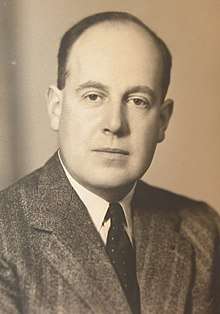R. W. Ketton-Cremer
| R. W. Ketton-Cremer FSA FRSL FBA | |
|---|---|
 | |
| Born |
Robert Wyndham Ketton-Cremer 2 May 1906 |
| Died | 12 December 1969 (aged 63) |
| Nationality | English |
| Education | Harrow School |
| Alma mater | Balliol College, Oxford |
Robert Wyndham Ketton-Cremer, FSA, FRSL, FBA (2 May 1906 – 12 December 1969) was an English landowner, biographer and historian. He bequeathed his family seat, Felbrigg Hall, to the National Trust.
Early life
Robert Wyndham Cremer was born on 2 May 1906 to Wyndham Cremer Ketton-Cremer and his wife Emily Bayly.[1][2] He was educated at Harrow School. He and his brother assumed the surname Ketton-Cremer in 1924. He won an exhibition to Balliol College, Oxford where he read English Literature.[3] While at Oxford he published poetry.[4]
Life at Felbrigg

He was a descendant of the Wyndham family, who owned the Felbrigg estate in Norfolk,[6] and was known as "the Last Squire".[5] He inherited the estate on the death of his father in 1933. Wyndham Ketton-Cremer's heir, his younger brother Richard, died in Crete during the Second World War. Ketton-Cremer also owned the Beeston Regis estate, including what is now Beeston Hall School.
Wyndham Ketton-Cremer never married. He was a homosexual, at a time when homosexual acts were still criminalised, but although the legal reality necessitated discretion, his sexuality was widely accepted by his friends.[7] He stood godfather to the children of his friends, including Tristram Powell, son of novelist Anthony Powell, to whom the novel The Kindly Ones was dedicated. He read proofs of Powell's books and suggested improvements, up to the time of his death.[8]
Public appointments
He was a justice of the peace and as such was required to witness two hangings. He was a major in the East Norfolk Home Guard during the Second World War.[1] He served as High Sheriff of Norfolk in 1951-52[5] and was a trustee of National Portrait Gallery.[1]
Writing
Ketton-Cremer wrote widely on the history of his native Norfolk as well as number of biographies, including one of Whig statesman William Windham, one of politician Horace Walpole, and one of the poet Thomas Gray, for which he won the James Tait Black Award. An annotated bibliography was published in 1995. His works include:
- The Early Life and Diaries of William Windham. Faber and Faber, London, 1930.
- Horace Walpole: A Biography. Faber and Faber, London, 1940.
- Norfolk Portraits, 1944
- Norfolk Gallery, 1948
- Country Neighbourhood. Faber and Faber, London, 1951.
- Thomas Gray, 1955
- Norfolk Assembly, 1957
- Forty Norfolk Essays, 1961
- Felbrigg: The Story of a House, 1962
- Norfolk in the Civil War: A portrait of a society in conflict. Faber and Faber, London, 1969. ISBN 057109130X
Honours
In 1968, Ketton-Cremer was elected a Fellow of the British Academy (FBA).[6] He was also an elected Fellow of the Society of Antiquaries of London (FSA) and Fellow of the Royal Society of Literature (FRSL). He was awarded an honorary Doctor of Letters (LittD) by the University of East Anglia in 1969.[1]
Death and legacy
Ketton-Cremer died on 12 December 1969. He bequeathed Felbrigg Hall to the National Trust.[5]
A brief memoir was written shortly after his death by the literary scholar Mary Lascelles.[6]
To mark the 50th anniversary of the decriminalisation of sexual activity between men in England and Wales, in summer 2017 the National Trust organised a national "Prejudice and Pride" campaign highlighting the LGBT themes in its properties. At Felbrigg Hall that included displaying a short film—narrated by Stephen Fry—in which it was revealed that Robert Wyndham Ketton-Cremer had been gay, a fact previously only known to his close friends.[9] Two of Ketton-Cremer's godchildren criticised the decision, claiming that a public outing would have been against Ketton-Cremer's wishes and accusing the Trust of using their godfather's private life to generate publicity.[10] Fry defended the Trust's decision, stating that Ketton-Cremer had only kept his sexuality a secret because of pervasive homophobia and fear of prosecution during his lifetime. According to Fry, the desire to hide the sexual orientations of Ketton-Cremer and other LGBT historical figures "is to suggest that same-sex love and gender diversity is somehow wrong" and that "keeping these stories hidden only lets prejudice—past and present—go unchallenged."[11]
References
- 1 2 3 4 'KETTON-CREMER, Robert Wyndham', Who Was Who, A & C Black, an imprint of Bloomsbury Publishing plc, 1920–2016; online edn, Oxford University Press, 2014; online edn, April 2014 accessed 4 Aug 2017
- ↑ "Index entry". FreeBMD. ONS. Retrieved 5 August 2017.
- ↑ Awards at Oxford & Cambridge 1860-1984. Harrow Association. Retrieved 1 August 2017.
- ↑ Duffy, Nick (26 July 2017). "National Trust and Stephen Fry under fire for ‘outing’ historical figure". Pink News. Retrieved 27 July 2017.
- 1 2 3 4 Robert Windham Ketton Cremer. National Trust. Retrieved 1 August 2017.
- 1 2 3 Mary Lascelles, Robert Wyndham Ketton-Cremer, 1906-1969". Proceedings of the British Academy, 56 (1970 [1972]), pages 403-414.
- ↑ The National Trust ‘outs’ Norfolk squire as gay 48 years after his death. Sarah Knapton, The Telegraph, 21 July 2017. Retrieved 1 August 2017.
- ↑ Jay, Mike (Spring 2013). "Who Were the Dedicatees of Powell’s Works?" (PDF). Anthony Powell Society Newsletter (50): 10. Retrieved 27 July 2017.
- ↑ Lucy Pasha-Robinson (4 August 2017). "National Trust volunteers refusing to wear gay pride lanyards in protest over 'outing' former lord of the manor". The Independent.
- ↑ Steve Bird (29 July 2017). "National Trust criticised for "outing" country squire". The Telegraph.
- ↑ Sarah Knapton (21 July 2017). "The National Trust ‘outs’ Norfolk squire as gay 48 years after his death". The Telegraph.
External links
| Wikimedia Commons has media related to Felbrigg Hall. |
| Wikimedia Commons has media related to R. W. Ketton-Cremer. |